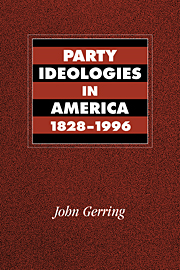Book contents
- Frontmatter
- Contents
- List of Figures and Tables
- Acknowledgments
- Part I Introduction: The Existence of Party Ideology
- Part II The Whig-Republican Party
- Part III The Democratic Party
- 5 The Jeffersonian Epoch (1828–1892)
- 6 The Populist Epoch (1896–1948)
- 7 The Universalist Epoch (1952–1992)
- Part IV Conclusions: Sources of Party Ideology
- Epilogue: 1996
- Appendix The Search for a Method
- Selected Bibliography
- Index
7 - The Universalist Epoch (1952–1992)
Published online by Cambridge University Press: 05 June 2012
- Frontmatter
- Contents
- List of Figures and Tables
- Acknowledgments
- Part I Introduction: The Existence of Party Ideology
- Part II The Whig-Republican Party
- Part III The Democratic Party
- 5 The Jeffersonian Epoch (1828–1892)
- 6 The Populist Epoch (1896–1948)
- 7 The Universalist Epoch (1952–1992)
- Part IV Conclusions: Sources of Party Ideology
- Epilogue: 1996
- Appendix The Search for a Method
- Selected Bibliography
- Index
Summary
From the perspective of most observers, Democratic ideology in the postwar period has followed on the heels of the New Deal. “[I]t is from the New Deal that liberalism in its contemporary American usage has acquired its principal meaning,” writes Samuel Beer. “And the stress on economic balance and economic security that was characteristic of the New Deal remained essential to the meaning of liberalism in its later embodiments in Truman's Fair Deal and the programs of the Kennedy- Johnson administrations.” Of course, writers have noted differences between the New Deal and the party's contemporary agenda – its support for civil rights, “postindustrial” values, “new politics,” and so forth – and there have been repeated attempts to define a “neoliberal” or “new Democrat” agenda for the party in the postwar decades. However, in the opinion of most scholars, the party of Bill Clinton is still the party of FDR, albeit in a rather attenuated form.
I shall offer two perspectives on Democratic ideology in the postwar period. Undoubtedly, the social justice elements of contemporary Democratic ideology mirror the ideals of the New Deal, but they also mirror the ideals of the Bryan-Wilson years. In short, if one looks at the party's commitment to welfare policy and wealth redistribution, as measured in content analyses of party platforms and nomination acceptance addresses, the postwar period looks like a continuation and extension of the Populist Democratic epoch (see figure 8 and figure 14).
- Type
- Chapter
- Information
- Party Ideologies in America, 1828–1996 , pp. 232 - 254Publisher: Cambridge University PressPrint publication year: 1998
- 1
- Cited by



